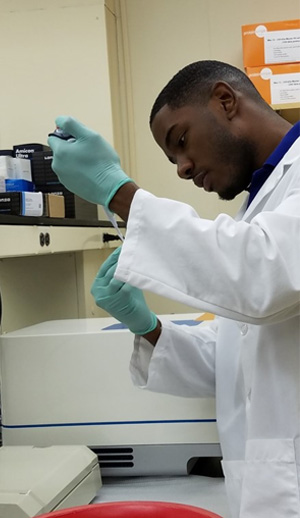
Hometown: Elmont, New York
Undergraduate: Temple University
Student's next step: Temple University School of Medicine (Class of 2021)
Can you tell us a bit about your background before coming to Drexel?
I was born and raised in New York. I moved from New York to South Jersey when I was about 14 years old. After high school, I decided to go to Temple University because it was in a big city and it was close to home.
Why did you decide to enroll in a post-baccalaureate program? And why did you feel the Interdisciplinary Health Sciences (IHS) program was a good fit for you?
I initially applied to the Drexel Pathway to Medical School program. I thought a direct entry program would be best for me and I could remain close to home and my mother. I knew I needed to strengthen my academic credentials if I wanted to get into medical school.
I think that it was best that I was not accepted into the Drexel Pathway to Medical School program when I applied. I think I underestimated the level of coursework. The IHS program ended up working better for me. It gave me the freedom to pick courses that I wanted to take in order to build on the foundations that I already had and eased me into more rigorous coursework. IHS also gave me the opportunity to participate in a year-long research project. I had conducted some research during undergrad but it was pale in comparison to committing to a year of research. I now have a full independent project. These were a couple of things that IHS gave me that I do not think I would have received anywhere else.
What influenced you to want to become a doctor?
My mom was a single mom who was always working, so I did not see her much growing up. My aunt helped take care of me and she was sick with multiple sclerosis. I always wanted to make her better, but had no way to do so. My aunt and her disease sparked my first interest in medicine. In addition, my mother, aunt and godmother are all nurses so I grew up with a lot of exposure to the health care field. I think these factors initiated my desire to be a doctor.
If someone gave you $1,000,000 to donate to a single charity of interest to you, to whom would you donate this money and why?
I think I would use the money to start my own charity so I could oversee how the money was being spent. My family is from Haiti. Haiti was just hit hard by Hurricane Matthew, the political infrastructure is terrible, people are starving and people are dying. I would love to be more active in my family’s native country. I would like to go back and do humanitarian work and form schools, hospitals and just about anything else. That is something I am genuinely passionate about.
Do you participate in any extracurricular activities or volunteer work?
Right now I am involved with the Lindy Scholars program. I work in West Philly and mentor middle school students in math and science. These are inner city kids who could easily go down the wrong path and they might not realize their own potential. These young kids do not see themselves becoming doctors, scientists, lawyers or business owners. We work with them to expose them to these opportunities so hopefully they will see themselves in one of these careers.
I am also a very active person. I love to work out, lift weights and play basketball.
Tell us about your current laboratory research project.
In my current research project, we are investigating type 2 diabetes. We’ve discovered that with an excessive caloric diet or high calorie intake, protein carbonylation occurs. We’ve also discovered that the GLUT4 receptor in adipocytes and skeletal muscle tissue is among the proteins being carbonylated. We have found that GLUT4 is not being relocated to the plasma membrane, where it would be bringing glucose into cells, mimicking type 2 diabetes. High excessive caloric intake is essentially leading to type 2 diabetes via mechanisms that we are not sure of, so we are trying to discover more about that mechanism.
What has allowed you to achieve your current accomplishments?
My support system. My mom and my sister have pushed me harder and further than I thought I could go. My family is always there for me and pushing me to succeed. Recently, I feel like I had a switch turn on that made me realize how passionate I am about medicine, and once that happened, I made changes to improve my work ethic, study habits and time management.
As one of our top students, what advice would you give to current and future IHS students?
Use every resource you are given. You are given MCAT courses and GRE courses. You have great faculty and advisors who will give you the time and advice that you need. Never neglect the help that is out there for you. Dr. GH (Dr. Anita Gaurnier-Hausser) and Matt Sanuck are always there to help you and always make time for you. Use everything you have before it is too late.
IHS has helped me so much. It has exposed me to so much. IHS taught me a lot more about what it takes to become a doctor. IHS made me a better student, a better learner, and I am thankful for the opportunities it has given me.